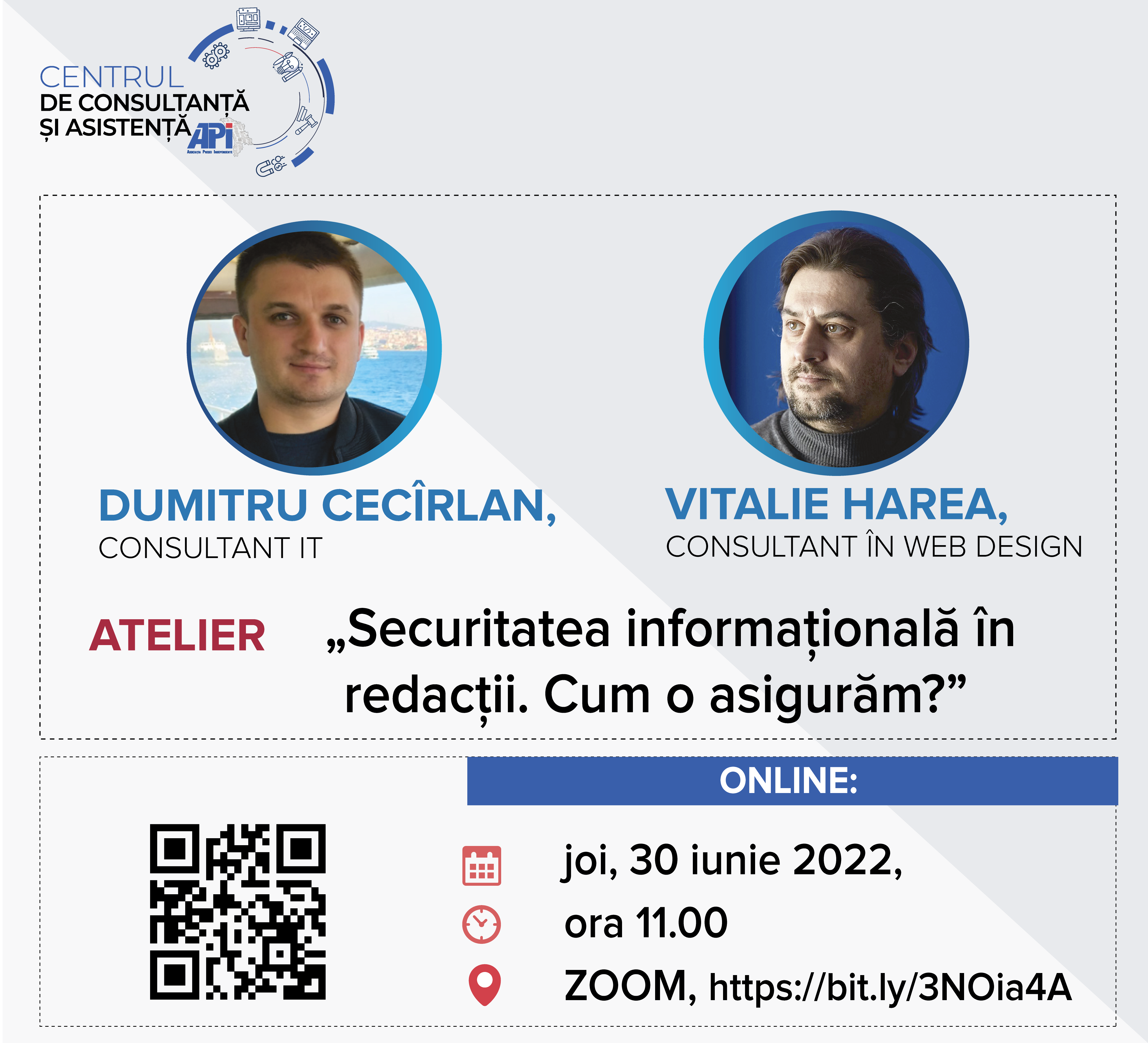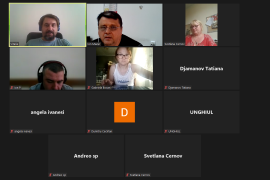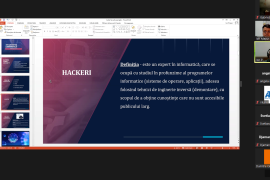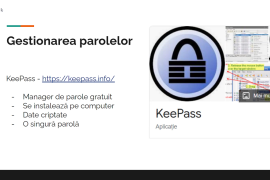back
Media Managers Should Include Strict Digital Security Compliance Rules In Employment Contracts

Capture Zoom.us
Information theft is common in the virtual environment, and criminals use various tools to reach the operating systems and applications of users in the online environment. Loss of information may have serious consequences, and journalists and media outlets are not exempt from this danger. That is why it is very important to take steps to ensure digital security. During the online workshop "Digital Security: How To Ensure It To Avoid Risks and Unwanted Consequences," trainers Vitalie Harea, web designer and Dumitru Cecîrlan, IT specialist, spoke to the participants about the threats of digital security, but also about the solutions to them, so that they are avoided. The training that took place at the end of June was attended by staff of newsrooms beneficiaries of the Center for Consulting and Assistance to Regional Independent Media Outlets.
In order to steal information from the virtual environment, software crackers install special programs on computers, taking advantage of the inattention or irresponsibility of some users. Subsequently, they blackmail them for financial purposes or sell the information to other people, companies, etc. "The basic rule is not to access links, unknown documents, not to download unverified programs from the Internet, not to respond to messages sent by e-mail from unknown addresses, even if the senders promise to leave you millions of dollars, etc. Each Google, Facebook, Instagram or other account must have separate, distinct passwords and authentication must be a two-step process. For passwords, use upper and lower case letters, numbers, special signs, e.g. a sentence in Russian written in Latin script, but it must be at least 12 characters long. A secure password looks like this: eX3Mp!ud#P@r0l2", and the most secure account should be email, as it is the easiest way to restore other accounts," Vitalie Harea, one of the trainers, said. He advised media managers to make sure there are at least two people in the newsroom who manage newsroom accounts, and that they are trusted people who can delegate platform update roles. Free or paid software can be used for password management, such as KeePass - https://keepass.info/ or LastPass - https://www.lastpass.com/, and to check whether an e-mail has been hacked –https://haveibeenpwned.com.
The second trainer, Dumitru Cecîrlan, spoke about computer security, the Windows operating system and websites created on the Wordpress operating platform. It is very important that those who manage websites regularly make backups the information published to recover it if there are external attacks.
The IT specialist presented examples of digital security breaches that he discovered by visiting some newsrooms: “I noticed that flower pots often hung over the computer, and this increases the danger of water spilling over the computer when we water the flowers. Equipment may thus fail and information will be lost. Do not drink water, coffee or tea above your computer or other electronic devices. Some have a bad habit of leaving the office without shutting down or blocking the computer, others display passwords in visible places, which is not normal in terms of information security. I also noticed that fire extinguishers were missing in some newsrooms, and where they existed they have not been checked on an annual basis.”
The trainers recommended to the media managers to specify clear rules of observance of digital security in their employment contracts in order to avoid some of the said risks.
"We have already implemented some of the things mentioned in the training, and others are still to come. For example, we divided the roles for managing Facebook in the newsroom. Each person has a separate password and access only to those compartments for which he or she is responsible. On Youtube, however, several people use the same password and the same email. We will solve this problem shortly as we understood that certain dangers may occur," said Andrei Popa, IT specialist at the Esp.md portal in Bălți. Another participant, Svetlana Cernov, from Estcurier.md website in Criuleni: “We will try to generate passwords using the programs offered by the trainers, but also to check if our email addresses have not been broken. For some time now, we have not used two-step password security, because we were bothered to do more operations. We will return to this option because, as it was said in the workshop, it is better to have extra hassles now than big troubles later.”
Full workshop recording is available HERE.
This June, API held another workshop on "Organizational Structure of Media Outlets, Why It Is Important To Have It and How We Make It." Since July 2020, API’s Consulting and Assistance Center has held 25 thematic online and offline trainings, attended by over 434 newsroom staff.
API member newsrooms and regional media outlets that are not API members but meet the minimum criteria of editorial independence and professional integrity may request the services of the Center by accessing the application on the website www.api.md.
The project "Continuation of the Programof Assiistance for Independent Regional Media Outlets" is implemented by the Association of Independent Press (API) and funded by the US Embassy to the Republic of Moldova. The views expressed hereunder belong to the authors of the project and do not necessarily correspond to those of the US Embassy.





